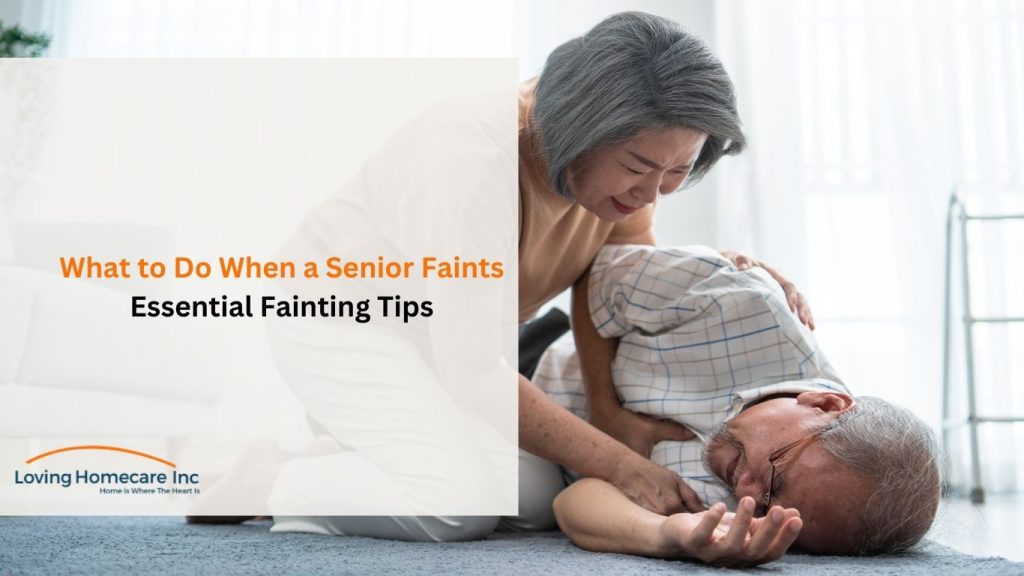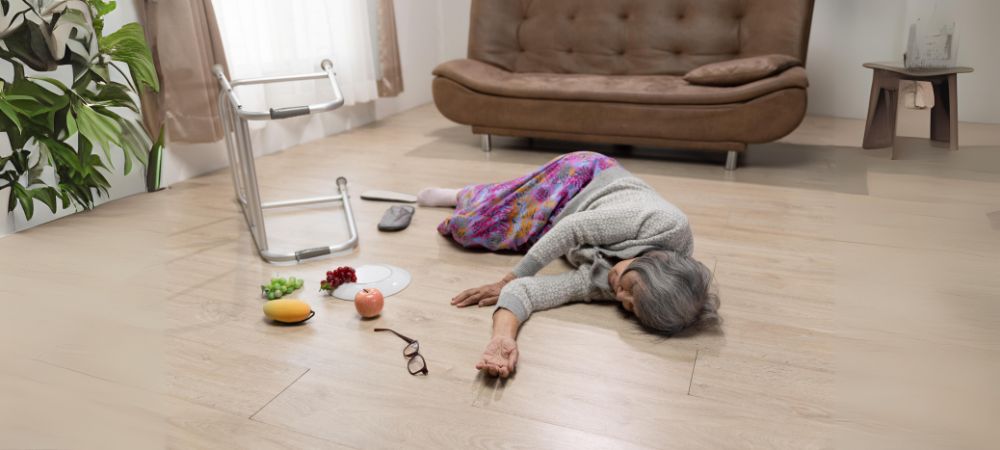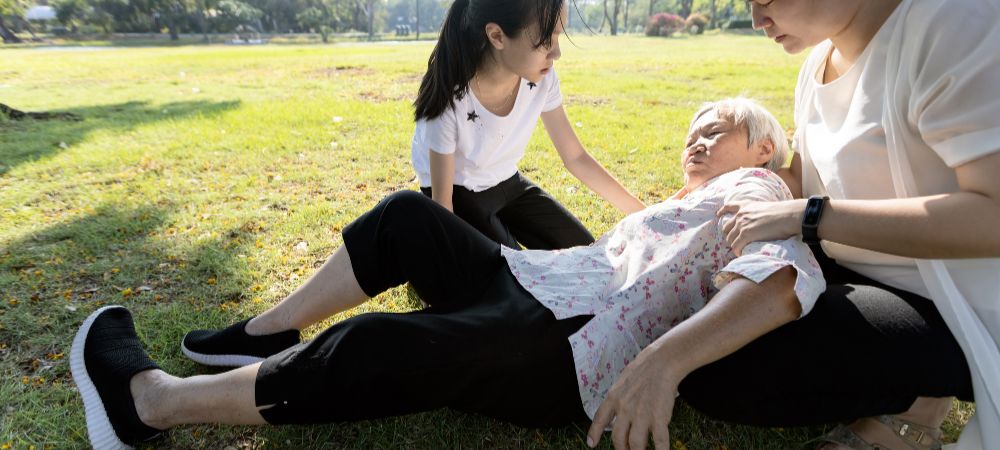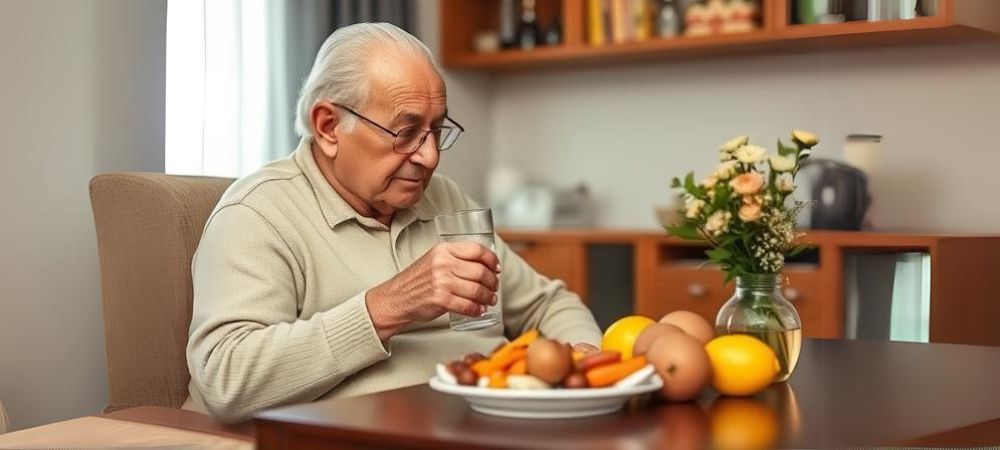Recently updated on November 6th, 2024 at 06:47 am
Most fainting spells among older adults occur due to various factors. Some common causative factors among older people include dehydration, hypoglycemia, and heart problems.
Identifying these triggers to make sure adequate care is undertaken. Further, Loving Homecare Inc discusses some tips on what to do when a senior citizen faints at home.
If you notice an elderly person feeling weak or dizzy, monitoring them closely is essential. Fainting in the elderly often strikes without warning.
What Causes Fainting in Seniors?
Reasons for Fainting:
There are causes of fainting in the elderly. Fainting spells in seniors include, but are not limited to:
- Dehydration: Inadequate fluid intake in the body can lead to low blood pressure.
- Low Blood Sugar: Missing meals can lead to fainting.
- Medication side effects: Some medications may cause dizziness or sleepiness as a side effect.
These are factors to consider that may explain the fainting spells in seniors.
Elderly fainting symptoms:
Recognizing the symptoms of fainting in elderly individuals is essential. General signs and symptoms include :
- Dizziness or lightheadedness
- Weakness of the legs
- Pale or clammy skin
- Nausea
If you witness these signs and symptoms, take them seriously. Swift action can prevent injuries.
What to Do When an Elderly Person Faints
When a senior citizen faints, here are some steps on senior fainting first aid :
- Check responsiveness: By gently shaking their shoulder and asking for their name.
- Position Safely: Place them on their back if they are unresponsive to increase blood flow to the brain.
- Legs Elevated: They should slightly elevate the legs to promote blood flow.
- Loosen Tight Clothing: Remove any tight clothes around their neck and waist.
- Vital Sign Evaluation: Check the person’s breathing and pulse until help is administered.
10 Useful Tips What to Do When an Elderly Person Faints:
-
Recognize the Signs
Situation: If you notice, he looks pale and sways slightly.
Helpful Tip: It is important to know the signs of fainting in the elderly person. It includes lightheadedness, weakness, pale skin, and confusion. If you notice these signs, immediately ask if he feels ill. If yes, ask him to sit down.
Being aware of the symptoms of an elderly person’s fainting would facilitate knowing what to do when a senior citizen at home actually faints.
-
Immediate Action
Scenario: You’re attending a family reunion, and from out of nowhere, your grandfather collapses to the living room floor, leaving everyone in an utter state of disbelief.
USEFUL TIP: Whenever fainting spells occur among elderly people, ensure their safety is always guaranteed. Gently bring them down to the floor so they don’t get injured.
Remove any objects nearby that can be used to inflict injury and ask other people to give you room to allow you to provide care. This step is primarily one of the first steps in giving first aid for senior fainting.
3. Check Responsiveness
Scenario: Your grandfather has fainted and lies unresponsive on the floor.
Helpful Tip: Shake his shoulder lightly and call his name. This is your initial move to determine how the victim is doing. If he does not respond, you must follow further steps on what to do if your elderly person faints.
If he responds, comfort him and stay with him in a comfortable position.
4. Positioning
Scenario: Your grandfather has not come around after fainting but is looking stable.
Useful Tip: Lay him flat on the back and slightly raise his legs. This position helps increase the flow of blood towards the brain, accelerating the recovery process.
You can raise his legs with the help of a pillow or even by stuffing a rolled-up blanket under them. This is an important technique for knowing what to do if a senior citizen faints at home.
5. Loosen Clothing
Scenario: You have just laid your grandfather down, and his shirt is now constricting around his neck.
Useful Tip: Loosen or remove tight clothing that may constrict blood flow or breathing. Elevate him, if need be, to avoid overheating.
This simple step plays a significant role in fainting treatment at home for elderly individuals.
6. Vital Signs
Scenario: You’re watching your grandfather closely as he regains consciousness.
Helpful Tip: Keep an eye on his breathing and pulse. If he starts breathing normally, reassure him that it is over and that he is safe. If he has unusual symptoms such as chest pain or severe confusion.
These could be more serious conditions, and he needs to get to the hospital. Understand what causes fainting in older adults to better inform your monitoring for him.
7. Hydration and Nutrition
Scenario: After the fact that your grandfather has not been drinking enough water lately.
Useful hint: The next time around, to avoid such an episode of fainting in a senior, one can always encourage hydration and nutritionally balanced meals.
Sometimes, the reasons for fainting with seniors are dehydration and low blood sugar. Tell him to drink water and small nutritious snacks.
8. Emergency Response
Scenario: Your grandfather is unconscious for over a minute.
Useful Tip: Call emergency services immediately if he has not come back into consciousness. Knowing what to do if a senior faints may save his life.
If first responders are called in, be prepared to offer them information about his medical condition and the medication he may be taking.
9. Post-Faint Care
Scenario: Once your grandfather wakes up, he’s looking disoriented, but he’s starting to speak.
Useful Tip: Let him lie down briefly and avoid sudden movements. If he is conscious enough to drink, give him small sips of water.
This is the important evolution phase after fainting, whereby keen observation comes into prominence.
10. Consult a Healthcare Provider
Scenario: You talk to your family about what happened after the incident, then decide it is time for a check-up.
Useful tip: After experiencing a fainting episode, it is always important to consult a healthcare provider. Discuss the episode with the doctor to rule out critical underlying conditions.
They may further recommend some tests for determining definitive fainting treatment at home for senior citizens and how to manage risks effectively.
Conclusion:
These various tips underlined here have truly shown a concrete and straightforward way of tackling fainting spells amongst seniors. F
These incidents can be prevented by ensuring hydration and proper nutrition. Lastly, consulting a health provider after an incident is also important for the purpose of evaluating health conditions that might have been the cause of such incidents and determining necessary treatment accordingly.
Being prepared for such an incident and well-informed on dealing with home treatment for seniors who have fainted. This contributes greatly to a safer environment for the elderly.
FAQs




